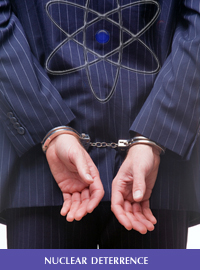
|
Much as with firearms, the problem with nuclear weapons isn’t their existence – which, as we’ve seen, can be laudably prophylactic – but the hands they may fall into.
|
|
| “Now this is the Law of the Jungle -- as old and as true as the sky; And the Wolf that shall keep it may prosper, but the Wolf that shall break it must die.” – Rudyard Kipling
This is an age of contradictions in Washington, when the capitol city’s always tenuous relationship between words and actions has devolved into a fantasia worthy of Franz Kafka. Yet none of the recent delusions in the nation’s capital have been as perverse in their inversions of reality than the Nobel Peace Prize-winning President of the United States attempting to upend a formula that has preserved peace for six decades: nuclear deterrence.
This week in Washington, President Obama hosted the Nuclear Security Summit, a gathering of 47 nations aimed at reducing nuclear proliferation and staving off the threat of nuclear terrorism. A few of the summit’s marginal initiatives – working to prevent the spread of loose nuclear materials to terrorist groups, for instance – were laudable and susceptible to legitimate influence from the attending governments. But the Summit’s philosophical aspiration – “a world,” as Obama put it, “without nuclear weapons” – is both unrealistic and actively dangerous.
Nuclear weapons weren’t invented in time to prevent World War II from breaking out – but they were invented in time to end it. With the war concluded everywhere except for the Pacific Theater by mid-1945, President Harry Truman was faced with an excruciating choice: utilize the most destructive weapon known to mankind or authorize a ground invasion of Japan that would have likely devolved into door-to-door urban warfare and astronomical casualties on both the American and Japanese sides. Truman chose the former – and peace came both sooner and at lower cost in human life as a result.
In the 55 years that have followed, nuclear weapons have never again been utilized – this despite the fact that they have become increasingly easy to acquire. How could such an inverse relationship exist? Through two intimately connected reasons:
First, nuclear weapons escalated the costs of total war. With the atomic haymaker held quietly but permanently in reserve, combatant nations were careful not to let their conflicts spiral out of control. That’s why – despite a few close calls – the Cold War never went nuclear and many of its proxy conflicts (such as Korea and Vietnam) ended with an ambiguity that would have been difficult to imagine in a pre-nuclear era.
Second, nuclear weapons have traditionally only been in the hands of liberal democracies or states that were susceptible to conventional deterrence. The United States, Great Britain, France, Israel and India fall into the former category. China, Russia and Pakistan represent the latter. But with North Korea gone nuclear, Iran on its way and Pakistan susceptible to an Islamist uprising, this is not the time to tie our nuclear hands behind our back.
Obama suffers a delusion common to left-wing thinkers who can’t conceive of the world in anything but terms of relative power: he seems to believe that by creating a more “just” international power structure (read: one with less American might) he can soothe the fears of adversaries cowering in the shadow of the United States. This is gibberish. Is anyone in any corner of the world living in fear of an unprovoked nuclear first strike from the U.S.? Can the same be said for North Korea or Iran?
The conceit of the nuclear reduction strategy is that the world will be inspired to move towards peace if only America takes the first step (if this sounds familiar, it’s the same strategy that has failed to work on reducing international carbon emissions). This is a theory jubilantly impenetrable by reality. Outside of Obama’s wonderland, aggressive nations are less likely to be guided by the Golden Rule than by the lesson of the Melian Dialogue – “the strong do what they can and the weak suffer what they must.”
Thus, when Obama says that the U.S. will not respond to chemical, biological or cyber attacks with nuclear force, he lowers the cost of doing violence to this nation. When he signs onto an arms reduction with Russia that stipulates the weakening of missile defense, he ignores the fact that any state looking to weaken purely defensive capabilities is not a state to be trusted. And when he puts his faith in parchment treaties, he demonstrates to rogue regimes who prioritize raw power over the fictions of international law that their sledding will be that much easier.
Much as with firearms, the problem with nuclear weapons isn’t their existence – which, as we’ve seen, can be laudably prophylactic – but the hands they may fall into. It creates the exact same prisoner’s dilemma – as long as the bad guys have them, the good guys need to have them too. And as long as they exist, the bad guys are going to be pursuing them. In other words, the President is wasting our time… dangerously. |


